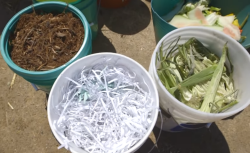What is Composting and Why Do It?
Composting is nature’s way of recycling. It is the controlled, natural decomposition of organic matter. Micro and Macro organisms break down organic materials into compost, or humus, a nutrient-rich soil amendment that improves the health and efficiency of your garden ecosystem from the ground up. There are many benefits of composting ranging from positive environmental impacts to financial savings. If you are on the fence about starting a compost pile, we hope some of the benefits listed on this page will convince you to start!
Environmental Impacts of Composting:
-
Reduce methane production at landfills caused by
decomposition of organic materials.
- Methane is a greenhouse gas that is much more potent than carbon dioxide!
- Finished compost can be applied to gardens, pastures, and
landscapes. This increases organic matter content in the soil which
leads to:
- Healthier food and increased production.
- Increased water retention which replenishes underground aquifers, decreases runoff, and prevents erosion.
- Boosts soil microbial health.
- Erosion control.
- Compost modifies the physical soil properties, improving water-holding ability and resistance to compaction. For this reason, compost is commonly being used as an erosion control material that enhances soil.
Financial Benefits of Composting:
- Composting reduces the volume of organic materials, allowing you to save on hauling costs.
- Increased water retention in the soil means less irrigation, and savings on your water bill.
- Save money by avoiding the purchase of synthetic fertilizers, soil amendments, and pesticides.
- Mid-scale composters can gain extra income by selling finished compost (please note permitting requirements may apply and the County of San Diego only allows a certain volume to be sold annually).
Community Composting & Mulch Events

When yard waste and food scraps go in your green organics bin, it becomes nutrient-rich compost which can be used in parks, gardens, and farms. This compost and mulch is provided FREE at community compost events for unincorporated residents. Click HERE to see if an event is happening near you or call 1-877-R-1-EARTH (1-877-713-2784). Also, go to WasteFreeSD.org to sign up to be alerted when an event is coming!
Organic Materials Ordinance Update
Composting is easy within the unincorporated area! On September 14, 2022 (Item #7), the Board of Supervisors voted unanimously to adopt the Organic Materials Ordinance Update, an ordinance amendment for composting standards in the unincorporated area. Planning & Development Services and Department of Public Works developed the Organic Materials Ordinance Update project to help divert organic materials (e.g., food scraps, plant materials, and agricultural materials) from landfills. This was achieved by making amendments to the County’s zoning ordinance and regulatory code to allow organic material processing or composting to occur in more areas of the unincorporated county. Specific changes included:
- adding more composting allowances on agricultural land;
- allowing community composting in residential settings and adding more allowances for composting in community gardens;
- creating small- and medium-sized commercial composting categories;
- providing more permit options that reduce the cost and time to process composting applications; and,
- ensuring the protection of public health and safety by including best management practice requirements to address issues of stormwater runoff, odors, pests, and others.
Start composting:
The County offers free composting workshops and discounted compost bins to unincorporated area residents. Click on the buttons below to get started!
-
Resources
- Compost it Yourself: Guide to Backyard Composting
- Home Composting Resource Guide
- Yard Trimmings Recycling Guide
- Solana Center for Environmental Innovation hosts free workshops and shares fun compost how-to's.
- County News Center presents: "School Kids Talk Trash and Composting!"
- Compost & Mulch Market Study







